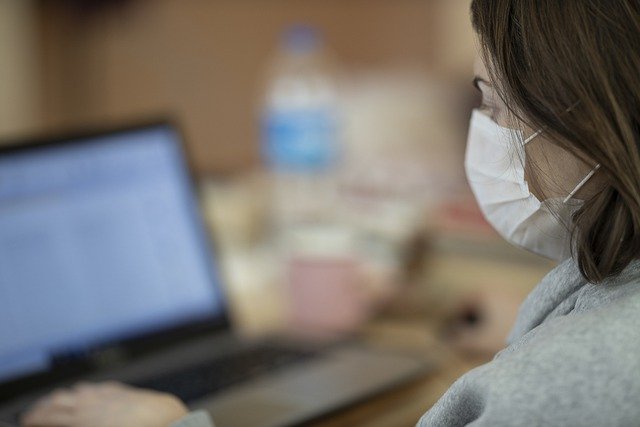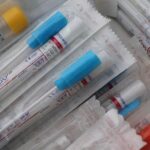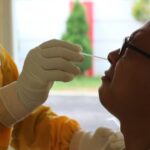
While many Americans work from home, 26% of the US workforce is still working in a physical workplace during the COVID-19 pandemic. Personal health and safety concerns associated with contracting the coronavirus in the workplace is adversely impacting employees’ mental health. The stress of potential exposure to the deadly virus at work is contributing to a significant increase in mental health disorders amongst essential workers.
To improve employees’ mental health and increase workforce productivity during the COVID-19 pandemic, employers must implement a health and safety program in the workplace. The program must facilitate employee access to physical and mental health resources, and provide mandatory coronavirus testing for your business to help alleviate your employees’ COVID-19 related safety concerns.
Alleviate Your Employees’ Concerns
Employers operating essential businesses during the COVID-19 pandemic must provide a safe workplace for their employees in order to reduce workplace stress and anxiety. According to a national poll conducted by the American Psychiatric Association, almost half of Americans live in fear of contracting the potentially-deadly viral disease.
The fear of contracting the coronavirus has spiked anxiety disorders among the population. A recent report revealed prescriptions for anti-anxiety medications have increased by 34% during the COVID-19 pandemic. Providing regular coronavirus tests and offering educational programs that teach employees about natural health boosters and prescription medications can help alleviate any COVID-related anxiety among your employees by helping them feel more in charge of their health.
Why Should Businesses Conduct COVID-19 Tests?
All employees should be frequently tested for an active COVID-19 infection at least once a week in order to prevent transmission of the virus in your workplace. COVID-19 testing for your business may or may not be legally mandated depending on your location, but it is crucial for preventing any (potentially more costly) outbreaks among your employees, as well as for alleviating your employees’ health and safety fears.
It’s understandable that testing large numbers of employees on a particular schedule can be a very complex and demanding process for many businesses. However, it is an essential part of maintaining a safe workplace that employees feel comfortable coming to and that will not be shutdown due to an outbreak.
Fortunately, some medical service providers offer specialized programs designed specifically for business coronavirus testing. These medical facilities streamline the process of testing hundreds of people on different sites and locations, and deliver the test results to the business in a timely manner. If you have a large number of employees or multiple business sites, you should seek assistance from these medical service providers to ensure your workplace is virus-free.
Business Coronavirus Testing Locations
While your employees can get a COVID-19 test in hospitals and clinics, it is generally recommended to get tested for the coronavirus in well-ventilated areas with a limited number of people in order to mitigate the further spread of the virus. A study published in JAMA Internal Medicine revealed that COVID-19 transmission rates were significantly higher in enclosed, non-ventilated areas compared to well-ventilated spaces.
The safest ways to test your employees are in an at-home or drive-thru setting. Self-isolating in a home or car helps avoid contracting or spreading the disease to and from others. You can arrange a custom business coronavirus testing package with a medical facility, in which executives are tested at home while the rest of the staff is tested in a private drive-thru.
What COVID-19 Test Do Businesses Use?
COVID-19 testing for businesses uses the polymerase chain reaction (PCR) diagnostics method to identify an active coronavirus infection in your employees. The PCR COVID-19 test is considered to be the gold standard of coronavirus diagnostic tests, as it produces the most accurate results. The PCR test conducted for businesses is identical to the standard PCR test performed on individuals.
COVID-19 PCR Test
The COVID-19 PCR diagnostics test detects the coronavirus’ genetic material from the collected sample to determine whether the patient is currently infected with the virus. The PCR test, also known as the RNA or molecular test, collects a mucus or saliva sample from the patient to be analyzed on-site or sent to a laboratory. The PCR coronavirus test can be conducted in hospitals, clinics, drive-thrus, and even your own home.
COVID-19 Testing Procedure for Businesses
The procedure of coronavirus testing for businesses will differ depending on where you require your employees to be tested. These are a few of the locations testing may be conducted:
COVID-19 Testing in Hospitals and Clinics. A COVID-19 diagnostics test performed inside a hospital or clinic requires employees to travel to the medical facility to get tested. Once inside the facility, a healthcare provider will use a swab to collect a saliva or mucus sample from employees’ nose or back of the throat. The collected sample is then analyzed on-site or sent to a laboratory for analysis. We do not recommend that businesses test employees through public clinics or hospitals. It puts the onus on individual employees to get tested and deliver the results to the business, making the process disorganized and untimely.
At-Home COVID-19 Testing. An at-home COVID-19 diagnostics test requires businesses to schedule an appointment with a medical facility to send a healthcare professional to an employee’s home for sample collection. On the day of the appointment, a licensed clinician will travel to the patient’s home to perform the throat or nasal swab. The clinician will then take the sample back to their facility or send it to a lab to analyze it for the presence of the coronavirus. This is an apt method for testing executives who would rather be tested in the comfort of their own home or who don’t have time to wait in the drive-thru.
Drive-Thru COVID-19 Testing. Medical facilities that provide business coronavirus testing services can arrange private drive-thru testing at the location of your workplace. You should arrange the location of the drive-thru test with the medical service provider offering COVID-19 testing for businesses. Private drive-thru testing is an extremely convenient method for businesses to test large amounts of employees in a safe and timely manner.
Once the site has been determined, employees will drive to the site in their own car to get tested for an active COVID-19 infection. While seated inside their car, a healthcare professional will perform a nasal or throat swab on the employee, who can then leave. The entire testing procedure lasts for less than ten minutes. The collected sample is sent for laboratory analysis. Your employees can receive their test results within 24 to 72 hours.
Periodic Coronavirus Testing Increases Workforce Productivity
For the millions of Americans who must work in a physical workplace during the COVID-19 pandemic, the stress and anxiety of potentially contracting the virus at their place of work can adversely impact their job performance. Mental health disorders resulting from the coronavirus pandemic can significantly hamper workforce productivity.
To promote a safer work environment and increase your workforce’s productivity during the global coronavirus pandemic, you must develop a health and safety protocol for your business that provides mandatory weekly COVID-19 diagnostics testing, and offers easy access to healthcare resources.
Adopting stringent safety protocols for your business helps alleviate employees’ concerns about working in a public location during the pandemic. Regular coronavirus testing both reduces employees’ fears of contracting the virus at their workplace and prevents employers from dealing with a costly outbreak. Providing resources that address your employees’ physical and mental health ultimately benefits the company as a whole by increasing workplace productivity, preventing outbreaks, and generating confidence in the company’s management.













